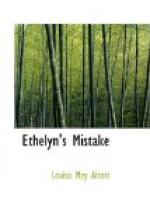This morning, however, it was not needful that Aunt Barbara should waken her, for long before the robin sang, or the white-fringed curtain had been pushed aside from Aunt Barbara’s window, she was awake, and the brown eyes, which had in them a strange expression for a bride’s eyes to wear, had scanned the eastern horizon wistfully, aye, drearily it may be, to see if it were morning, and when the clock in the kitchen struck four, the quivering lip had whispered, oh, so sadly, “Sixteen hours more, only sixteen,” and with a little shiver the bed-clothes had been drawn more closely around the plump shoulders, and the troubled face had nestled down among the pillows to smother the sigh which never ought to have come from a maiden’s lips upon her wedding day. The chamber of the bride-elect was a pleasant one, large and airy and high, with windows looking out upon the Chicopee hills, and from which Ethelyn had many a time watched the fading of the purplish twilight as, girl-like, she speculated upon the future and wondered what it might have in store for her. One leaf of the great book had been turned and lay open to her view, but she shrank away from what was written there, and wished so much that the record were otherwise. Upon the walls of Ethelyn’s chamber many pictures were hung, some in water colors, which she had done herself in the happy schooldays which now seemed so far away, and some in oil, mementos also of those days. Pictures, too, there were of people, one of dear Aunt Barbara, whose kindly face was the first to smile on Ethelyn when she woke, and whose patient, watchful eyes seemed to keep guard over her while she slept. Besides Aunt Barbara’s picture there was another one, a fair, boyish face, with a look not wholly unlike Ethelyn, herself, save that it lacked the firmness and decision which were so apparent in the proud curve of her lip and the flash of her brown eyes. Fair-haired and blue-eyed, with something feminine in every feature, it seemed preposterous that the original could ever make a young girl’s heart ache as Ethelyn Grant’s was aching that June morning, when, taking the small oval frame from the wall, she kissed it passionately, and then thrust it away into the bureau drawer, which held other relics than the oval frame. It was, in fact, the grave of Ethelyn’s buried hopes—the tomb she had sworn never to unlock again; but now, as her fingers lingered a moment amid the mementos of the years when, in her girlish ignorance, she had been so happy, she felt her resolution giving way, and sitting down upon the floor, with her long hair unfastened and falling loosely about her, she bowed her head over buried treasures, and dropped into their grave the bitterest tears she had ever shed. Then, as there swept over her some better impulse, whispering of the wrong she was doing to her promised husband, she said:
“I will not leave them here to madden me again some other day. I will burn them, every one.”




